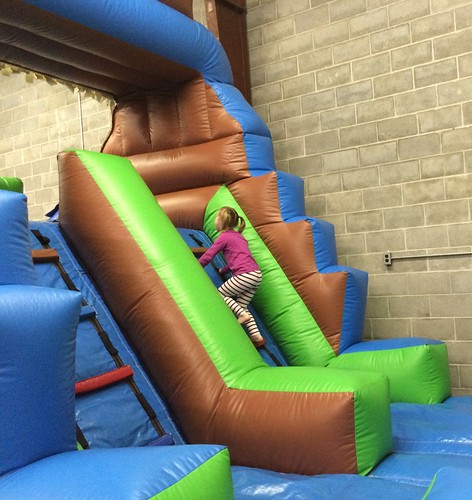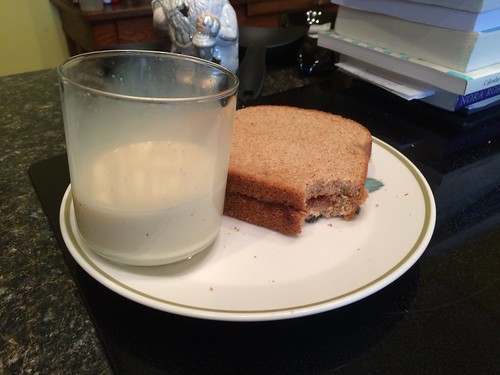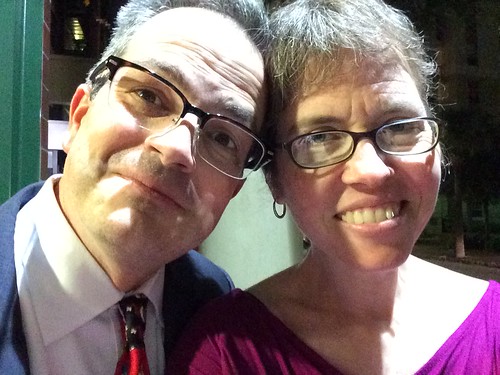 Celebrating life, friendship, and donuts, my Christmas Eve column for the City Paper.
Celebrating life, friendship, and donuts, my Christmas Eve column for the City Paper.Wednesday, December 24, 2014
Saturday, December 20, 2014
Holiday
I'm in a weird emotional space currently, so I was very tempted to title this post "Holiday shit." But I don't know that I want to write about holiday shit. Do I? I don't think so. In general things are very good. It's just that the shit emerges and hangs around every day--not always, but some.
Ah, shit.
So here are some holiday pictures.
And finally, two pictures related to me:
Ho ho ho.
Ah, shit.
So here are some holiday pictures.
 |
| Maybelle and Nonni playing at the Cookeville children's museum. Such a small, sweet, effective place for Maybelle to play. She loves it, and it's four blocks away from my parents' house. |
 |
| This great jump land. Maybelle loved it. |
 |
| Peanut butter and honey sandwich, eggnog drink. Excellent holiday lunch. |
 |
| Latte, Christmas cookie, and my reading for spring semester in a quiet coffee shop. |
Ho ho ho.
Tuesday, December 16, 2014
Rape article
I've written about it before, and I'll do it again. Our campus, our college, and our cities do such a nightmarish approach to rape and sexual assault that most victims don't report, particularly since these systems often interpret this victim as lying, being ridiculous, or asking for it.
My latest City Paper column: Rape victims shouldn't report their assaults to campus police
My latest City Paper column: Rape victims shouldn't report their assaults to campus police
Friday, December 12, 2014
The perfect child
Today I read a piece by my friend Amy Julia Becker. She writes about her life, and about her daughter, Penny, who has Down syndrome. She writes in political, religious, and personal ways. An excellent writer and resource.
The article triggered some thoughts in me. I'm not in any way saying that Amy Julia said something inappropriate--not at all! Instead, I'm thinking about my reactions. It can be so easy to see a child with Down syndrome as just as good as.
As I read about Penny becoming a serious contender for her third grade class, I thought, "Whoa, great spelling and reading, Penny!" Then a few minutes later, walking across campus, I realized that another thought was bubbling up: "She's 8. She can spell all kinds of words. Maybelle's 6, and she can be almost impossible to understand, not to mention to spell. She'll never win the spelling contest. I have to work on this!"
I have to work on this! I should bring her home from school early so that we can study math! I'm not effective enough as a mother!
And the next level:
She's not acceptable as a person with Down syndrome unless she's impressive! What kind of person will she be if she and I don't work hard enough?
This, of course, is a kind of guilt-ridden series of thoughts that I would have had anyway--it's not exclusively because Maybelle has Down syndrome. My mother has assured me many times that my freaking-out-motherhood is pretty normal, and I believe her.
But I know that having Down syndrome does make Maybelle's life complicated in certain ways, and it's easy for me to fall into the trap that says things are only okay if she's slow, but ultimately they same as every other. She's just slow. But she'll get there.
Fortunately yesterday and today I saw my good friend Cindi May, who happens to be a national expert on best-practices for including kids with intellectual disabilities in the school system. She's amazing, and she told me several things that stuck with me:
The article triggered some thoughts in me. I'm not in any way saying that Amy Julia said something inappropriate--not at all! Instead, I'm thinking about my reactions. It can be so easy to see a child with Down syndrome as just as good as.
As I read about Penny becoming a serious contender for her third grade class, I thought, "Whoa, great spelling and reading, Penny!" Then a few minutes later, walking across campus, I realized that another thought was bubbling up: "She's 8. She can spell all kinds of words. Maybelle's 6, and she can be almost impossible to understand, not to mention to spell. She'll never win the spelling contest. I have to work on this!"
 |
| We all know what an important member of the food group frosting is. I'm proud to say that Maybelle and I loved it. |
And the next level:
She's not acceptable as a person with Down syndrome unless she's impressive! What kind of person will she be if she and I don't work hard enough?
This, of course, is a kind of guilt-ridden series of thoughts that I would have had anyway--it's not exclusively because Maybelle has Down syndrome. My mother has assured me many times that my freaking-out-motherhood is pretty normal, and I believe her.
But I know that having Down syndrome does make Maybelle's life complicated in certain ways, and it's easy for me to fall into the trap that says things are only okay if she's slow, but ultimately they same as every other. She's just slow. But she'll get there.
Fortunately yesterday and today I saw my good friend Cindi May, who happens to be a national expert on best-practices for including kids with intellectual disabilities in the school system. She's amazing, and she told me several things that stuck with me:
- Maybelle's not supposed to meet the academic standards of kids her age. Ever. She's going to fall behind her peers in lots of ways. And that's fine. What matters is that she has the skills that will help her to be functional: an ability to connect with other people, to behave, to pay attention, to interact with her peers, to communicate as best she can. Of course she's supposed to get as much as she can from her school work, but that's not ultimately not the point.
- And schools need to know that this isn't the point. Recently a couple of people told me that Maybelle would need to do kindergarten again because she hasn't gotten all her kindergarten stuff this year. Cindi said, "If we believed that, then she'd be in kindergarten for the rest of her life. She's not going to learn what typical kids learn in kindergarten. And if professionals believe that she's so slow that she shouldn't be with her peers, she'll be pulled out into special ed."
- "It doesn't matter who she is or how much she fits our models of school expectations. What matters is that she learn to be a person in the world, and her peers learn it, too. She has to be included in her classes."
You got it, Cindi. She always says thing to me that resonate, make me hopeful, make me ready to keep fighting. And she loves Maybelle for the person Maybelle is. They sing together, laugh together. Cindi's tough with her. Her whole family both adores Maybelle and is happy to set boundaries for her. They recognize Maybelle as a six year old kid.
As I was thinking about this, I started thinking about a part of my book, the book I'm working on. Is it fair to put a few of those paragraphs here? I guess I will:
But I’ve begun to move beyond this initial framing. I’m questioning, challenging the notion that everything is fine because Maybelle’s differences are merely delays. The point isn’t that Maybelle is as smart as typical folks. The point isn’t that she’ll eventually be that smart, or close to it, if we wait long enough and work hard enough. The point isn’t that she has other qualities that “make up for” her intellectual disability. What would that even mean?
The point is that she’s a valuable human being, just as she is. Everything is fine because she’s a person in the world. I don’t want to make her fit into existing systems—I want her to help challenge and change those systems. “Normal” is not the goal. Maybelle may never do certain things our culture defines as “normal” and therefore acceptable. She may never write, because fine motor skills are incredibly difficult for her. Even at five, she hates holding a marker and will only make vertical lines and circles on the paper. She’s an impressive reader, at this point more literate than many of her classmates, but this is in large part because people with Down syndrome are often visual learners. It doesn’t mean in some simplistic way that Maybelle is “smarter.” Will she ever talk clearly? Will she ever understand mathematics enough to pay for things? Will she ever be able to drive? I don’t know.
And yet I argue that she’s a full and valuable person, an identity that I initiated as her mother. But Maybelle’s full personhood doesn’t stop with me or with my family. Full, valued personhood demands broader societal recognition. It demands recognition at the practical level: Maybelle and many other people must have schools and other kinds of support, like occupational therapy and accessible housing, available to them. More importantly, this recognition must also take place at the ideological level, in the ways we evaluate human identity.
So many of my valuable friends and colleagues have made this point: George Estreich, Rachel Adams, Michael Berube (do you have a better website than this, Michael?). Ian Brown has addressed the issue. Nancy and Bridget Brown. I know there are so many more…I can't list them all (even Elizabeth, Kate, Lisa, and Meriah). I'm not alone in this, and it really helps.
So let me end with another quote from my book:
George says that Laura isn’t qualitatively different from any children. He writes, “Anything can happen. We do what we would do if they had the same number of chromosomes: we try to prepare them for the future we don’t know.” When Maybelle was born, I didn’t know about the “perfect child.” As she became a human being in my world, things became different. I try to prepare her for the future, and it became clear to me that preparation has nothing to do with being the perfect kid. I began the process of releasing my hidden beliefs about childhood and parenthood. It’s about loving who we have. Recognizing that the world is full of diversity, and inviting diverse people to the table.
Saturday, December 6, 2014
Re-entering the larger world
I've been going to campus almost every day for the last two weeks. I've been making myself a presence--something that's been scary to me and an important recognition for other people. I look different. It often takes colleagues a double-take when they see me. And then they're welcoming, asking me how I am.
This week one colleague/friend held a welcome back drop-in at her house. The house was full of wonderful people and freaking delicious food, plate after plate. Like my efforts to go on campus, this event was another way for me to connect to my colleagues and friends.
As I put away tart after tart from Sugar, folks would tell me that it's clear that I have more energy now than I had earlier in the fall. For instance, in October I did a big interview as part of becoming a full professor. Colleagues who were part of that process said that I did a great job, but that they could tell how I tired I was, and how I was having to push myself. I went home and fell asleep after that interview.
I'm no longer that person. I haven't taken a nap in a couple of weeks. A couple of weeks! I've been working effectively on plans for next semester's classes. I'm reading things related to chapter 6 in my book. I'm planning a couple of additional interviews for the book. I've been connecting to my friends more effectively.
I'm feeling more and more like myself.
So at age almost-42, I tried it again.
Not bad! I had a total of two bites of food because I just kept talking and talking, to former grad students, colleagues, folks I know only vaguely, and Maybelle's beloved ECDC teacher.
Here's how the conversations went:
"Alison, how are you?"
"I'm doing much better. I'm grateful to be back at school, and getting ready for next week's classes."
"You look great! Your hair looks great!"
This was a moment when I needed to decide how much information they wanted. With a couple of people, I had them check out how quickly my hair has grown on my neck--you can see the amount of hair that's responded to being shaved. A lot of hair. And you can compare it to the hair on the left side of my head and it's growing, but very slowly. I'm not sure if that's what they wanted.
"And how's Maybelle?"
This is another point where I didn't know what to share--do they want the real story ("She's had a challenging several months. All kinds of changes. Fighting with my mom because that was the only predictable/safe place. Etc.") or the normal one ("She's great!)?
And then it was sort of surprising to hear from almost every person, "I read your blog, so I've been keeping up with how you're doing." One person said, "I read the article from The City Paper, and I never cry, but that article made me cry so much."
Oh. Well, maybe they all wanted the in-depth interview. Or maybe they just want to touch base with me since they know a million things have happened since they've been reading. That made me realize that I haven't been able to do much blogging in previous months. But I'm feeling better now, so I can blog.
I'm so glad I got to see so many of you, to have so many hugs. I'm glad to be back on campus, to have a seat at my desk, to snuggling into the Starbucks chair as a space to read.
Here I am!
 |
| LH mercy they are so good. I want to go eat some right now. |
As I put away tart after tart from Sugar, folks would tell me that it's clear that I have more energy now than I had earlier in the fall. For instance, in October I did a big interview as part of becoming a full professor. Colleagues who were part of that process said that I did a great job, but that they could tell how I tired I was, and how I was having to push myself. I went home and fell asleep after that interview.
I'm no longer that person. I haven't taken a nap in a couple of weeks. A couple of weeks! I've been working effectively on plans for next semester's classes. I'm reading things related to chapter 6 in my book. I'm planning a couple of additional interviews for the book. I've been connecting to my friends more effectively.
I'm feeling more and more like myself.
So at age almost-42, I tried it again.
Not bad! I had a total of two bites of food because I just kept talking and talking, to former grad students, colleagues, folks I know only vaguely, and Maybelle's beloved ECDC teacher.
Here's how the conversations went:
"Alison, how are you?"
"I'm doing much better. I'm grateful to be back at school, and getting ready for next week's classes."
"You look great! Your hair looks great!"
This was a moment when I needed to decide how much information they wanted. With a couple of people, I had them check out how quickly my hair has grown on my neck--you can see the amount of hair that's responded to being shaved. A lot of hair. And you can compare it to the hair on the left side of my head and it's growing, but very slowly. I'm not sure if that's what they wanted.
"And how's Maybelle?"
This is another point where I didn't know what to share--do they want the real story ("She's had a challenging several months. All kinds of changes. Fighting with my mom because that was the only predictable/safe place. Etc.") or the normal one ("She's great!)?
And then it was sort of surprising to hear from almost every person, "I read your blog, so I've been keeping up with how you're doing." One person said, "I read the article from The City Paper, and I never cry, but that article made me cry so much."
Oh. Well, maybe they all wanted the in-depth interview. Or maybe they just want to touch base with me since they know a million things have happened since they've been reading. That made me realize that I haven't been able to do much blogging in previous months. But I'm feeling better now, so I can blog.
I'm so glad I got to see so many of you, to have so many hugs. I'm glad to be back on campus, to have a seat at my desk, to snuggling into the Starbucks chair as a space to read.
Here I am!

